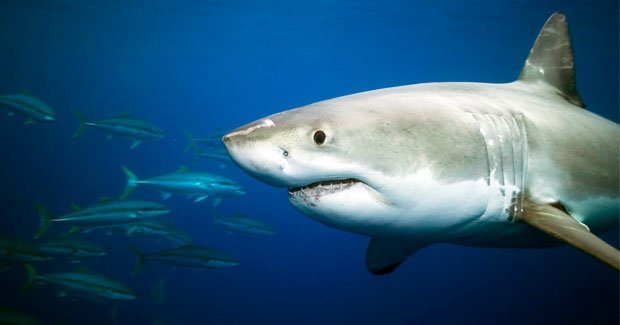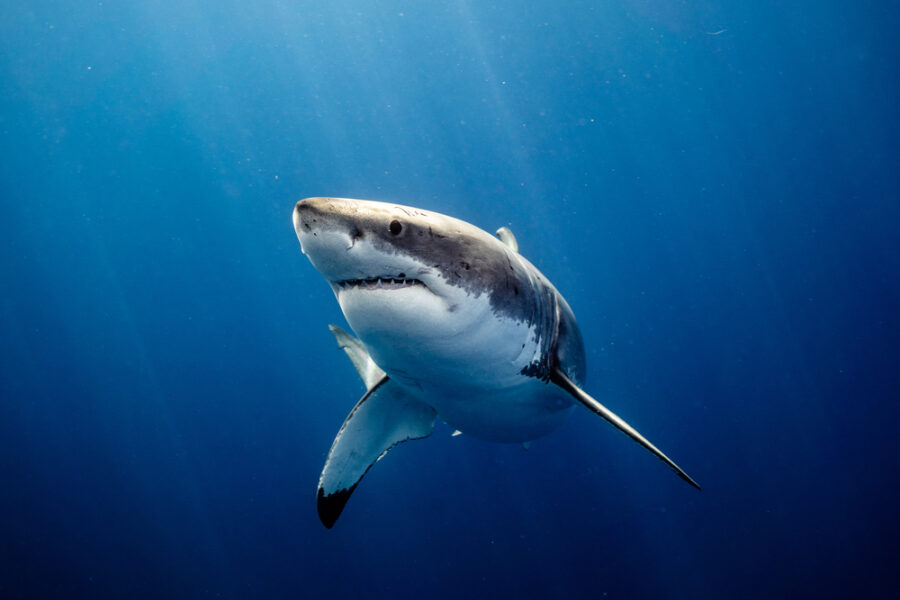Sharks were almost wiped out in a mysterious event 19 Million Years Ago. Could it happen again?

Sharks are without a doubt evolutionary champions. The earliest shark-like fossils date back to the late Ordovicianperiod, which occurred around 450 million years ago. However, while these are thought to have come from animals that shared many similarities with sharks, they may not have been true sharks. Either way, true sharks were definitely present soon after. Shark-like teeth evolved, followed by the characteristic body shape, fins and tail during the Devonian, 420-360 million years ago.
Being such an old lineage, sharks have certainly faced their fair share of environmental and climatic threats. In fact, they (or their relatives) have been through all of Earth’s mass extinction events. While each of these events was momentous, the degree to which sharks were affected varied. When sharks survived better than others, they rapidly filled the ecological niches opened up by those that failed to survive, and they flourished.
Other events caused more catastrophic losses to sharks. Still, every time, they bounced back.
The last, and probably most famous extinction event was the Cretaceous-Paleogene (K/Pg) mass extinction event, which occurred about 66 million years ago. The K-Pg extinction was huge – it wiped out around three-quarters of all species in existence. This included many species of sharks, with diversity loses to the group likely in the range of 50-80%.
Despite the severity of the event, shark diversity recovered quicky over the subsequent ~5-million-years. New species evolved to take the place of those that had been lost. It was also during this time that the earliest relatives of our most recognised shark families evolved.
Mystery extinction event
The time following the K-Pg extinction was a period of relative stability for sharks… or, so we thought.
By examining the diversity of teeth and shark scales, called denticles, from deep-sea sediment core samples, Yale University researcher, Elizabeth Sibert, and Leah Rubin from the College of the Atlantic uncovered a previously unknown extinction event. This one, however, was very targeted towards sharks. At least, that’s what the initial findings show. Now that the event is known, though, there are sure to be more discoveries and revelations to come.
Evidence from the ‘almost accidental’, but ground-breaking discovery suggests that this event was so big that sharks practically disappeared from open-ocean environments in a geological blink of the eye (i.e. less than 100,000 years), completely quashing 40 million years of stability.
Shark abundance declined by a staggering 90 per cent, or more, which conveyed a 70 per cent reduction in diversity. While it seems that relatively few shark species were spared, migratory and coastal lineages seemed to fare slightly better overall compared to open-ocean species.
Strangely, this major extinction event, which occurred ~19 million years ago, doesn’t fit with any known environmental or global climate event, or the proliferation of other large predators that could have outcompeted sharks. The cause is completely unknown. The only clue seems to be that samples from the time period show a disruption to sediment accumulation, which may indicate a decrease in ocean productivity. More simply, there may have been less food.
Considering the ratio of shark-to-fish fossils in the core samples, it seems that non-shark fish species were not (or, at least, were far less) affected. As a result, this event marked a significant tipping point for open-ocean animal communities, and paved the way for many new mid- and top-level marine predators.
Even more bizarrely, and unique to this event, shark diversity appears to have not recovered, meaning that our current shark diversity is only about one-tenth of what it was a mere 19 million years ago. While the 500+ species of sharks currently in existence may sound like a lot, we now know that these only provide a small representation of what shark diversity once was.
Given that sharks form one of the oldest enduring vertebrate lineages on the planet, with almost unmatched capacity for survival, the finding that a completely unknown and so-far unexplained event suddenly wiped out 90 per cent of the population is incredible.
Could history repeat itself?
So, it seems that shark survivability is not as infallible as we thought. This is especially concerning given they are now facing another monumental, and probably the most unusual, threat to their existence yet: human activity. That is, the extreme – and very unnatural – rate of change that humans are causing. Sharks simply cannot evolve fast enough to cope.
Oceanic shark and ray abundance has already declined by more than 70% over the past 50 years, predominantly due to overfishing. The changing climate will only compound these losses. At present, only one-third of shark and ray species are considered ‘safe’ from extinction risk. This latest study really highlights just how fragile and susceptible to change our modern sharks may be.
Dr Blake Chapman is an expert in shark-human interaction and the author of Shark Attack: Myths, Misunderstandings and Human Fear.



